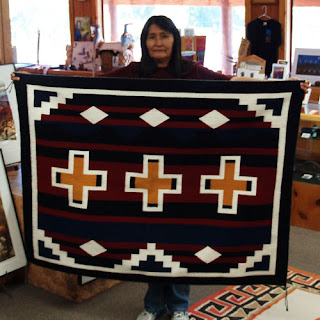Many people view museums as a place to view extraordinary objects and, if you are fortunate, have informative conversations with the attendants. I can certainly appreciate that sentiment, since some of my best museum experiences involve looking at displays while talking with staff members. I have even been invited into a few curation rooms and have seen many unusual artifacts. In most cases, the explanations of curators and docents added more to the relic than I could have imagined.
One thing I have realized is that art is primarily about the artist, and the artist is molded by his or her work. When I look at a rug by Eleanor Yazzie, I see her woven into the fibers, I can hear her voice and remember her children and the family’s yellow pickup truck. In a Tommy Jackson bracelet, I envision him pulling into the gravel parking lot on his Harley-Davidson motorcycle, eyes shaded by narrow sunglasses. To me it is those memories that make Eleanor's weavings and Tommy's jewelry extraordinary. People are clearly the most important part of our operation, and depending on who is in the store at any particular moment the exhibition can be quite captivating.
 |
| Navajo Cross Roads Twin Rocks Collection Weaving - Eleanor Yazzie (#123) |
Each visitor to the trading post has his or her own story to tell and distinct attributes to reveal. They have all experienced life on their own terms and are like mobile museums. Their demonstrations include culture from around the world, adventure in countless environments and knowledge about an endless variety of topics.
Yesterday our friend Skip strolled into the trading post after hiking in Cottonwood Wash. That afternoon his focus was on trees. After many years as an architect, Skip decided he was destined to be a fruit grower. As a result, he purchased acreage with a grove of apple trees and begun life anew. As he talked about the land and how it changed his life, a smile spread across his face. Skip described his grandfather, a man who allowed his young grandson to work in the elderly man’s extensive garden. That experience sparked a hunger that had lain dormant over 40 years. Unexpectedly, those seeds recently sprouted and Skip's passion blossomed.
Skip told me how he had once come upon a sandstone drain where several juniper saplings had taken root many decades before. He said the trees were huge, twisted and strikingly beautiful. Then he whispered, "I just went over and gave them a hug." I understood his emotion, since that is how I feel about many of the people who visit our trading post. Being a bit shy, I have most often refrained from embracing our patrons. As I grow older, however, I feel less inhibited.
Skip and I talked about a tree Jana recently purchased from a nursery in Moab. After we completed our transaction, the greenhouse attendant helped me put it in the back of our truck and bid us farewell. Before we drove off, I asked whether the unprotected tree would be all right during the 100-mile journey to Bluff. The assistant responded, "No problem, we have pretty strong winds here in Moab." Watching in the rear view mirror as we drove home, I agonized over every leaf that went skittering down the highway. When we finally pulled over, I saw the damage that had been done.
After I finished relating my story to Skip, he said, "You know Steve, it's going to take a long time, buckets of water and lots fertilizer to make that tree feel good again. It will need love to survive." That is the beauty of the human exhibits on display almost every day at Twin Rocks Museum, you just never know what treasures will be unveiled.
With warm regards Steve, Priscilla and Danny.

No comments:
Post a Comment